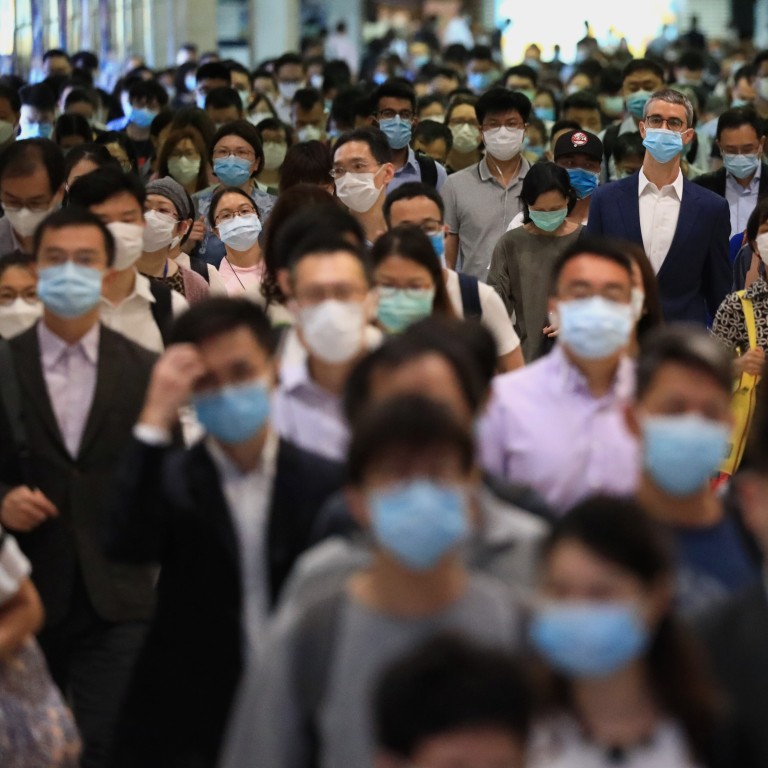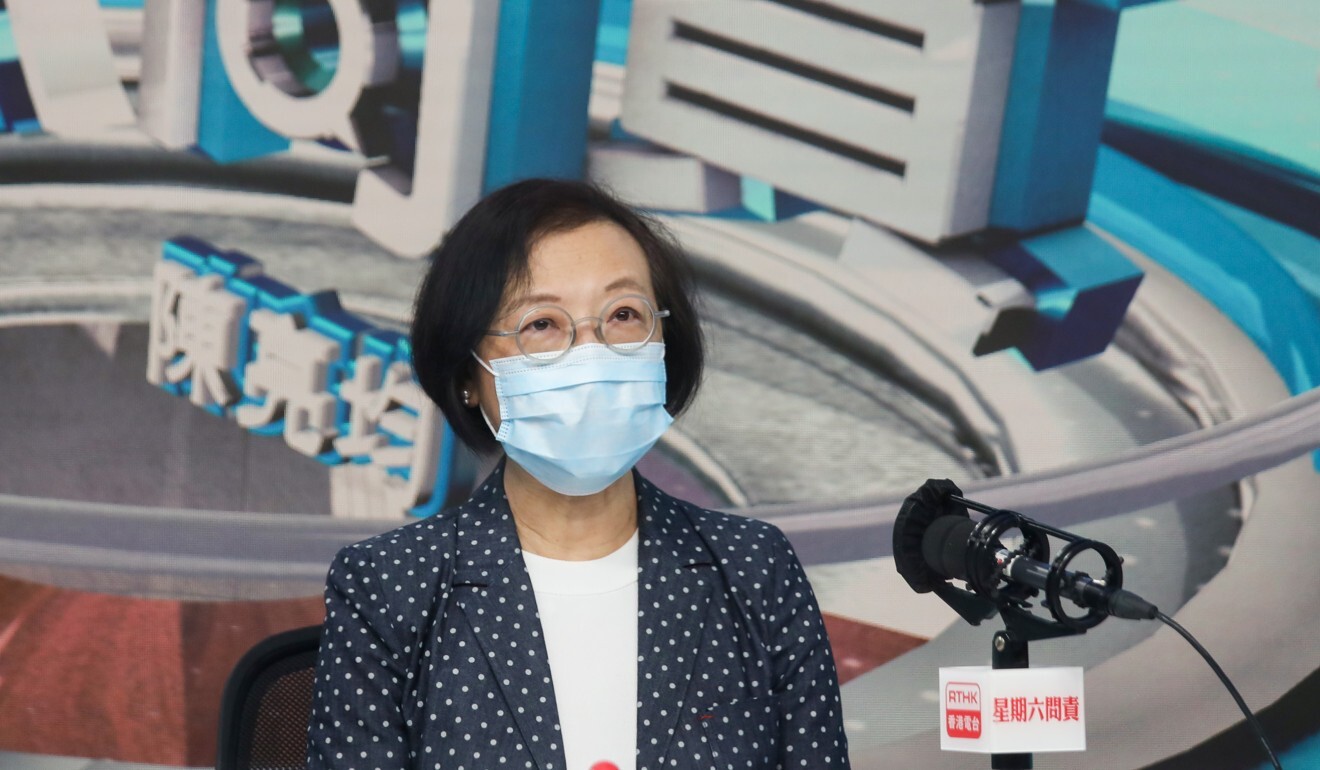
Hong Kong’s Covid-19 third wave ‘most severe’, with 61 new confirmed and provisional infections
- Top health official says recent surge eclipses the rush of cases in March, with source of so many infections now unknown
- Of Saturday’s 28 confirmed cases, 16 are locally transmitted, while dozens more people test preliminary positive
The city reported 16 local infections among the 28 cases officially recorded on Saturday, while another 33 people were awaiting confirmation they had caught the coronavirus.
The continued surge, which takes Hong Kong’s Covid-19 total to 1,431 with seven deaths, prompted pleas from health experts for the public to stay at home and avoid going into work where possible, while the government said it would not rule out a further tightening of social-distancing restrictions.
LATEST: Covid-19 patients can now infect four people, Hong Kong expert warns
“This third wave of infections is by far the most severe since the epidemic started, even worse than back in March,” said Dr Chuang Shuk-kwan, head of the Centre for Health Protection’s (CHP) communicable disease branch.
Among the 33 preliminary positive cases is a Hong Kong immigration officer stationed at a Shenzhen border checkpoint, as well as at least two taxi drivers.
“Now that there are outbreaks affecting restaurants, elderly homes, with some students affected as well as certain areas and some housing estates … we are concerned about the situation,” she said.
Urging the public to keep practising social distancing, Chuang said: “To avoid spread, we have to … avoid going out as much as possible, and try to work at home as much as possible.”
According to the Immigration Department, the 27-year-old officer who tested preliminary positive was assigned to Shenzhen Bay Port checkpoint and was responsible for processing travellers.
The senior immigration assistant last worked on July 8, sought treatment on his day off on July 9, and was informed about his preliminary positive results on Friday evening.
The department said the officer had no recent travel history and wore a mask while at work. It added that the CHP was trying to trace the infection source and whether the officer had any close contacts.
Official figures showed an average of about 3,000 people entered or exited Hong Kong each day at the Shenzhen Bay Port checkpoint over the past week.
Officials warn of hospital care crunch as Hong Kong hit with 38 new Covid-19 cases
Chuang said while the officer’s source of infection was not immediately clear, health authorities believed he might have been infected near his home in Tsz Wan Shan. At least three of Saturday’s confirmed patients lived in the Kowloon neighbourhood or had visited a market there.
“Because so far the [Covid-19] situation in mainland [China], and in Shenzhen, is much better than in Hong Kong, the chance of him getting infected from there is lower than the risk of infection from Tsz Wan Shan,” she said.
Although Chuang said more cases were expected in the area, she added: “Many people in Hong Kong do travel frequently from place to place … I think it’s not just Tsz Wan Shan. The whole of Hong Kong is facing an outbreak.”
Of the 28 confirmed infections on Saturday, 12 were imported, including a FedEx pilot, who arrived in Hong Kong from the United States on Friday night and had eaten at a branch of Din Tai Fung.
Six of the imported cases were from the Philippines, while the rest hailed from destinations including Azerbaijan, Germany, France and Turkey.

A total of 27 confirmed cases now relate to the Bun Kee Congee and Noodle Foods in Ping Shek Estate, Kin Wing Canteen in Tuen Mun and the eatery in Jordan, after three more infections were recorded on Saturday.
Another three confirmed cases are connected to the elderly care home, bringing the total there to 37.
A 29-year-old laboratory research assistant at the Hong Kong University of Science and Technology is also understood to be among the latest confirmed cases. His last working day at the Clear Water Bay campus was on Tuesday. His father, who went to the congee shop, is awaiting test results.
A 12-year-old secondary school student at Good Hope School in Ngau Chi Wan was also found to be infected. Her classmate had earlier caught the virus. A parent at the school has tested preliminary positive.
At least two taxi drivers, aged 66 and 71, were among the 33 preliminary cases, but officials said their cases were not linked to the six others confirmed as infected over the past few days.

With the city recording more than 170 new cases since Monday, Secretary for Food and Health Professor Sophia Chan Siu-chee warned of introducing stricter social-distancing measures.
Speaking on two radio programmes on Saturday before the daily press conference and on the day the city reintroduced tougher curbs, Chan said the government’s priority was to test all staff at elderly care homes.
Asked about the annual Hong Kong Book Fair, which is due to begin next week, Chan admitted that large-scale gatherings carried risks but said the organisers were “very careful”.
“The book fair has a lot of infection prevention measures such as social distancing and controlling the flow of people in place,” Chan said.
“We will keep monitoring the situation, continue doing our risk assessment and give the organisers our recommendations.”
Emirates became the latest airline to adapt its flight operations after Hong Kong authorities this week ordered mandatory testing for aircrew following a spate of cases involving pilots.
American Airlines and United halted flights while Dutch carrier KLM added a stopover in Bangkok due to the requirement.
“Emirates cabin crew on flights into Hong Kong will do a turnaround and not lay over at the destination. This is to ensure there is minimal disruptions to their rest times as the health and safety of our crew and passengers are always our top priority,” the company said in a statement on Saturday.
Additional reporting by Danny Lee


